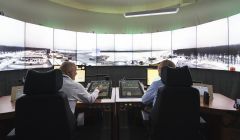News / Swedish airport operator insists remote tower technology is safe
With communities in the north concerned over plans to ‘centralise’ air traffic control services in Inverness, Shetland News asked Swedish journalist Kent Lidman to find out how the remote tower technology is working at Örnsköldsviks airport where it was introduced in 2015.
THE OPERATOR of the world’s first airport to install remote air traffic control said they have had no issues with the technology ever since it was introduced five years ago.
Around 100,000 passengers travel annually through the small Swedish airport at Örnsköldsviks, located around 350 miles north of Stockholm.
Air traffic at Sundsvall-Timrå and Linköping airports are also remotely controlled from a flight centre in Sundsvall. Kiruna airport, in the far north of the country, is the next in line for the technology to be introduced, and a second control centre is in the process of being set up at Stockholm-Arlanda for a number of smaller airports in central and southern Sweden.
Saab Digital Traffic Solutions AB, the company behind the technology, says the system is so successful that as many as 20 countries, including the UK and Norway, are looking to introduce it.
Designed to improve safety and to cut the costs of operating relatively small airports, remote tower technology allows air traffic controllers to run several airports simultaneously thanks to multiple cameras and sensors relaying data to one control centre.
Plans by Highlands and Islands Airports Limited (HIAL) to manage the airspace around five of its airports, including Sumburgh, Kirkwall and Stornoway, remotely as of 2023 has widely been criticised by the communities affected but welcomed by the airports operator’s main customer, Loganair.
Örnsköldsviks airport manager Robert Gyllroth said: “The remotely controlled system for airports is a very safe technology. We have tested it in action for nearly five years and have had no serious problems.
“We have about 35 employees here. When we installed the new technology we lost four employees as the flight leaders [air traffic controllers] had to move to Sundsvall, around 150 kilometres south from here.”
Become a member of Shetland News
Johan Landin of Saab Digital Traffic Solutions, described the technology and its backup as “very safe”.
“We have had no safety problems in just under five years at Örnsköldsvik. The system is approved by Luftfartsverket [the Swedish equivalent to the Civil Aviation Authority] for the whole of the European Union,” he said.
“We have three back up systems, if the electric power fails we have our own electric power generator.”
Both men accepted that the transition has not been without “social problems”, mainly in relation to air traffic controllers losing their jobs at individual airports.
At Östersund airport where the technology is due to be introduced in a number of years, there have been “protests against the remotely controlled system for airports”, Landin said.
However, the technology opens up new opportunities particularly for small rural areas, he said.
“You can have more small airports and they can be opened only by pressing a button.
“Now with electric planes coming in, you can have more airports for planes to land. Norway has very many small airports and they are planning to use this technology in at least 16 airports,” he said.
HIAL has said the company had not made up its mind as to which system of remote towers to procure. There are several providers to choose from with Saab being one.
Become a member of Shetland News
Shetland News is asking its readers to consider paying for membership to get additional perks:
- Removal of third-party ads;
- Bookmark posts to read later;
- Exclusive curated weekly newsletter;
- Hide membership messages;
- Comments open for discussion.
If you appreciate what we do and feel strongly about impartial local journalism, then please become a member of Shetland News by either making a single payment, or setting up a monthly, quarterly or yearly subscription.












































































